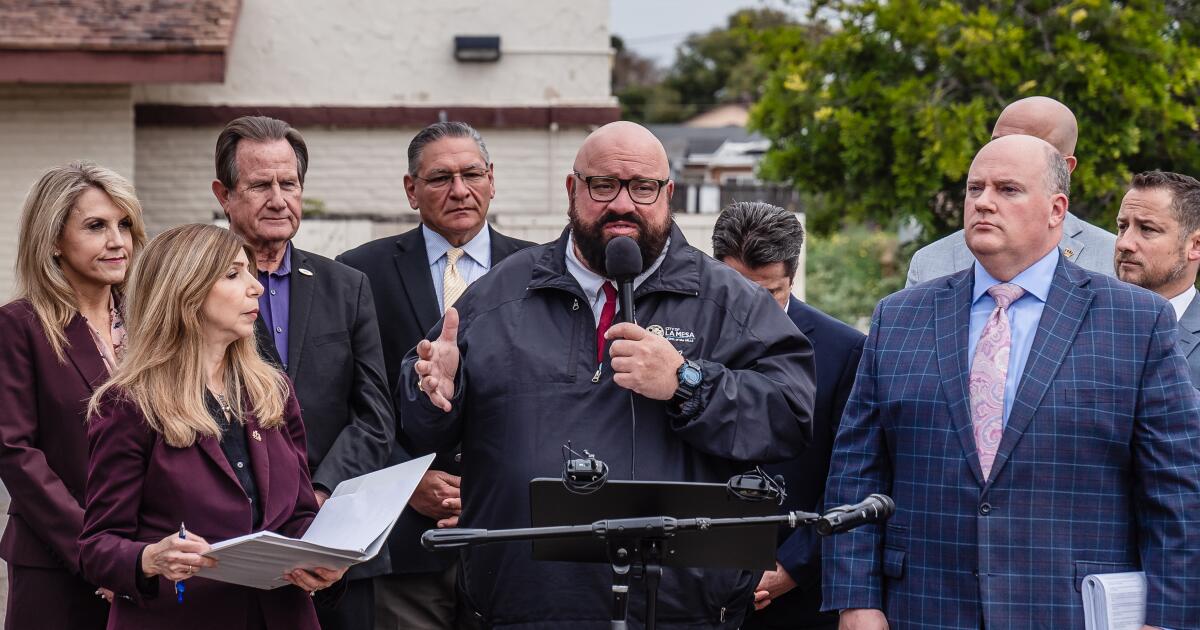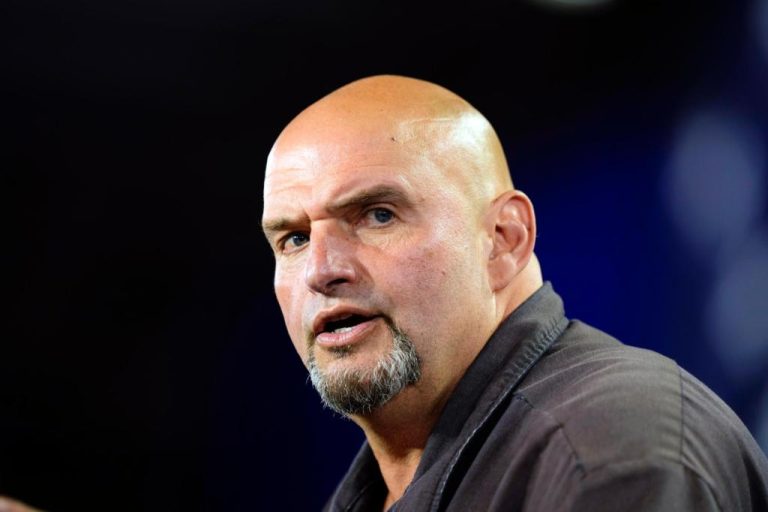
Local mayors and the county’s top law enforcement official gathered in Lemon Grove Sunday morning to support a circulating petition which seeks to increase penalties for repeated drug use and theft.
Their target is Proposition 47, a sweeping referendum approved by 59 percent of California voters in 2014. The law reclassified most nonviolent crimes involving property or drugs from felonies to misdemeanors. That includes shoplifting, theft, forgery and fraud if the value of items does not exceed $950, as well as most illegal drug use by individuals.
Supporters of the law, now finishing its first decade on the books, say it provides social justice for poor and otherwise-marginalized Californians. Those out collecting signatures this winter say it is responsible for a surge of lawlessness. Making so much bad behavior a misdemeanor, they say, is forcing stores to lock up everything from perfume to tube socks and taking away the tools that law enforcement needs to crack down on chronic repeat offenders.
The initiative, said San Diego County District Attorney Summer Stephan, would find a middle ground that would maintain some measure of forbearance while getting much tougher on repeat offenders, and especially against those who sell drugs that kill people.
“What it will do is restore the rule of law, holding repeat retail thieves and fentanyl dealers more appropriately accountable and incentivizing individuals who are struggling with drug addiction to take advantage of life-saving treatment,” Stephan said, speaking to reporters at Sunday’s news conference, where she and her colleagues urged the public to sign petitions.
The DA was involved in creating what is officially called “The Homelessness, Drug Addiction, and Theft Reduction Act.” The initiative needs about 550,000 signatures by mid-April and has thus far logged about 360,000.
If it makes the ballot and garners enough voter support at the polls, the initiative would create a new legal category of crime that its authors call a “treatment-mandated felony.” This new class would give prosecutors discretion to charge Californians with felonies on their third offenses, after two misdemeanor possession convictions, at which point “the offender would be given the option of participating in drug and mental health treatment.”
With successful treatment, a person’s “charge would be fully expunged, and the offender would receive no jail time,” according to the measure. Failure to complete treatment would get a third-time offender locked up.
There would be a similar approach for “smash and grab” thieves, escalating to a possible felony on the third documented offense. It would allow prosecutors to add together the values of multiple items taken across multiple incidents, punishing those who try to keep each theft below the $950 threshold that separates misdemeanors from felonies.
The initiative also would stiffen penalties for selling “hard” drugs, such as anything containing fentanyl, cocaine, heroin and methamphetamine, but not other drugs such as cannabis, peyote or magic mushrooms.
At several points during the prosecution process, dealers would be warned: “If you illicitly manufacture, distribute, sell, furnish, administer, or give away any real or counterfeit drugs or pills, and that conduct results in the death of a human being, you could be charged with homicide, up to and including the crime of murder.”
That approach works for Linda Colker, who stood with Stephan and mayors from throughout the region Sunday and recounted the loss of her daughter, Natalie, who became addicted to the painkiller Percocet after being prescribed increasingly-strong doses to numb the pain of surgeries required after high school sports injuries. Even after successfully completing rehab, Colker said, her daughter ended up purchasing what turned out to be fake Percocet pills from a street dealer. The counterfeit version of the drug, she said, contained fentanyl that caused a deadly overdose.
The pain of loss, she said, justifies taking action to change Prop 47.
“Another mother said this; I have a third-degree burn in my heart,” Colker said. “This initiative is so important to all of us.
“Fentanyl poisoning can happen to anyone. Fentanyl is laced in everything on the street.”
Some, though, are pushing back against the effort to change Prop 47, which is funded, in part, by a $1 million donation from Wal-Mart Inc.
Californians for Safety and Justice, a Sacramento-based nonprofit, released a statement Friday that called the negative assertions about Prop 47 made by law enforcement and others “disingenuous.”
Citing a recent statement from the state Board of State and Community Corrections, the organization says that Prop 47, by encouraging “community-based crime-prevention programs,” has “sharply reduced recidivism, homelessness and unemployment.”
“The data makes clear that the best public safety outcomes are achieved by strategically investing in programming rooted in the community aimed at helping people who have been incarcerated in the past get the support they need to regain stability and avoid ending up back behind bars.”
But the mayors who gathered in the parking lot of a Lemon Grove Wal-Mart Sunday weren’t having it.
Oceanside Mayor Esther Sanchez, a career public defender before getting into local politics, said her city has seen far too many voluntary substance-use treatment slots for repeat offenders go unused. And the City of El Cajon recently published a documentary video that shows its police officers offering assistance to many residents living on city streets; all but one declined.
“Voluntary treatment, unfortunately, does not work,” Sanchez said. “We need to have a carrot and a stick, unfortunately.”
Vista Mayor John Franklin, who said a Vons grocery store in his city cited shoplifting as a main reason for its recent decision to close, likened any pro-47 narrative to “asking Californians not to believe their lying eyes.”
“When you see it happen right in front of you, and when you see the businesses closing in your community, and when you see consumers that are working families not have a place to shop, our eyes tell us, and we don’t need anymore proof than that,” Franklin said.
The mayors of 14 San Diego County cities are supporting the initiative’s signature-gathering push. In addition to Sanchez and Franklin, they include: Escondido Mayor Dane White, El Cajon Mayor Bill Wells, National City Mayor Ron Morrison, Chula Vista Mayor John McCann, San Marcos Mayor Rebecca Jones, La Mesa Mayor Mark Arapostathis, Santee Mayor John Minto, Coronado Mayor Richard Bailey, Carlsbad Mayor Priya Bhat-Patel, Solana Beach Mayor Lesa Heebner, Encinitas Mayor Tony Kranz and Poway Mayor Steve Vaus.
While his name was not among the list of local mayors supporting the signature-gathering effort, San Diego Mayor Todd Gloria said in his state of the city speech on Jan. 10 that he will “be supporting statewide action this year to amend Proposition 47.”






